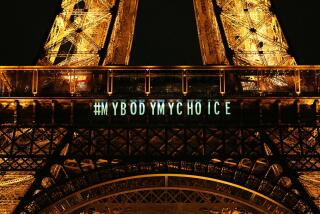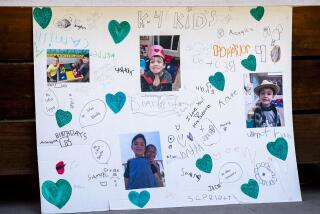Alcohol Is Often at the Wheel in France
- Share via
NOGENT-LE-ROTROU, France — The gendarme was off duty and drunk, but driving. In his gray Opel Corsa, Yves Laude weaved down Route Nationale 23, dodging holiday traffic on the road cutting through the pastures of southern Normandy.
Heading the other way, alone in her Volkswagen Golf, was Stephanie Abadie, 31, a real estate agent and the mother of two small boys.
Outside the farm village of Male, the gendarme’s car, traveling about 75 mph, lurched across the asphalt into the oncoming lane and slammed into the driver’s side of the Golf. Both cars were totaled and the drivers killed.
An autopsy determined that the 48-year-old Laude had so much alcohol in his bloodstream that he probably had downed two bottles of wine, or the equivalent of some other intoxicating drink, before leaving his barracks 60 miles away.
Abadie was killed more than a year ago. Her husband, Antoine Meley, is still filled with grief, disgust and anger that the woman he had loved for 14 years was “assassinated by an alcoholic.” He has written President Jacques Chirac, demanding an investigation into how a gendarme could be so drunk as he got off duty.
The recent death of Britain’s Princess Diana in a limousine driven by a legally intoxicated chauffeur in Paris has grabbed the headlines and mobilized scores of police officers, Meley points out. “But what about my wife?” he asks.
Sadly, the statistical truth is that what happened in both instances is not uncommon in France. Among all major European countries, it is in France where driving is the deadliest and where there is the largest percentage of traffic deaths and injuries linked to drinking.
Since 1950, more than 480,000 people have been killed on French highways and byways, a total approaching the combined number of fatalities, civilian and military, the country suffered in World War II.
A December 1995 report covering the 15 nations of the European Union found that, in a staggering 40% of fatal traffic accidents in France, and in 20% of the cases involving injuries, somebody was legally drunk or had been drinking. Of the other countries that reported statistics, none came close to that lethal cocktail of automobiles and alcohol.
In Germany, 20% of road deaths were alcohol-related; in Britain, 15%.
In 1994, the last year for which detailed figures are available, 3,742 people died on British roads. In France last year, the total was more than twice that: 8,080, or almost one death every hour.
“Thirty years ago, we chose this slogan in France: ‘Drink or Drive, You’ve Got to Choose,’ ” said Dr. Michel Craplet, a Paris psychiatrist who works with the National Assn. for the Prevention of Alcoholism. “But we’re still drinking and driving.”
That fact has given rise to the single most common legal offense in France. In 1994, the last year for which statistics are available, a record 101,000 drivers (95% of them men) were found guilty of having had too much to drink before they took the wheel. That was a quarter of French convictions for all offenses classified as misdemeanors.
Most of those convicted were given jail sentences, but the sentences were suspended in 90% of the cases.
Though alcohol consumption in France has been dropping slowly--by about 1% a year--since the early 1970s, the people who brought us champagne, cognac and some of the finest red and white wines remain the world’s largest consumers of alcohol, surpassed only by the inhabitants of small, neighboring Luxembourg.
In a year, the average French adult imbibes wine, beer, brandy and other intoxicating beverages containing 12 quarts of pure alcohol. Consumption in the United States and Japan, by contrast, is roughly half that--6.9 quarts.
Because drinking has been an ever-present feature of life since the Gauls and Romans planted vineyards here, there still is deep ambivalence about it and its effects. Wine--the most popular tipple--has been treated more as a foodstuff, an indispensable component of civilization and a life-giving medicine than as an alcoholic beverage.
In a country where you used to be able to see signs that read “Fight Alcoholism by Drinking More Wine,” there still is a persistent belief that wine and beer are more benign than hard liquor.
Millions of French men and women drink wine twice a day, with lunch and dinner, and some start the morning with a tumbler of white wine, a snort of brandy or something else to warm the blood. Yet despite the high alcohol consumption, one poll has found that 90% of the French believe they can say, “I avoid drinking too much.”
Another survey found that though 66% of respondents said they believe that alcohol can cause traffic accidents, only 22% never drink and drive.
Numerous questions remain to be answered about Henri Paul, 41, the Hotel Ritz security guard who was Diana’s chauffeur on her fateful Aug. 31 ride in Paris, and about the circumstances of the crash. But Paul was apparently one of the many French who feel that, at the wheel, they can shrug off the effects of drinking.
“Often enough, we used to take a spin in the car after a boozy meal, and it was always Henri Paul who drove, without any problem,” Dominique Melo, a psychology professor at the University of Rennes, has said of his longtime friend. Paul died along with Diana and her millionaire boyfriend, Dodi Fayed, 41, when their Mercedes-Benz hit a concrete pillar in an underpass at high speed.
Some physicians have said the drugs found in Paul’s blood--the antidepressant Prozac and Tiapridal, a sedative often prescribed for chronic drinkers--may have amplified the effects of the alcohol, making him feel ecstatic and overbold. Other doctors say they doubt there was an effect, or much of one.
But the presence of the chemicals is a reminder of another fact about France: As well as being big drinkers, the French are Europe’s most avid users of prescription drugs. They are the world’s leading takers of “mood-altering” preparations such as tranquilizers, antidepressants and sleep-inducing hypnotics, consuming three times as many as the Germans, Italians or British.
In a year, a person in France buys more than 30 boxes or bottles of prescription drugs, versus 15 for the average German and six for an American.
Almost two years ago, as part of ongoing efforts to reduce the carnage on its roads, France stiffened its DUI law to make driving with a blood alcohol content of 0.5 grams per liter of blood an offense punishable by a fine. In simple terms, that gave France one of Europe’s toughest laws, and a tolerance for drunken driving lower than anywhere in the United States.
When a driver’s blood alcohol content reaches 0.8 grams per liter--equivalent to the legal limit set by California and 14 other U.S. states--a tougher French law takes effect, and the motorist can be sentenced to two years in prison, have his or her license suspended for five years and be hit with a $5,000 fine.
Has the new legislation made Gallic drivers sit up and take notice? In a manner of speaking, said Craplet, the Paris expert on alcoholism. He said he is asked a lot about the new limits, “but it’s by people who want to know how much they can drink without reaching the 0.5 level.”
Likewise, Jean-Marie Leverrier, a member of a national organization lobbying for better road safety, finds old habits are remarkably resistant to change. In Viessoix, a village in the Norman hedgerow country, a drunk driver recently killed a young farmer riding on a motorbike. Local elders gathered to debate how to prevent further deaths.
“At the end of the meeting,” recalls Leverrier, “the mayor said, ‘Let’s have a coffee’--and no coffee in that part of the world is drunk without a snifter or two or three of Calvados [apple brandy]. So we all went to the local cafe, had a few, and everybody then drove away.
“These folks were sincere--but they weren’t at all about to start questioning their way of life,” said Leverrier, who became a crusader for traffic safety after his 14-year-old daughter, Benedicte, was struck and killed by a motorcyclist in Le Mans.
The prevailing Gallic logic--blame the drinker, not what he drinks--means that in roadside restaurants on France’s autoroutes, or superhighways, customers can wash down their meals with alcohol, then roar back into the traffic flow. Gas stations are allowed to sell alcohol to go except between 10 p.m. and 6 a.m.
The U.S. institution of the “designated driver” has yet to catch on in France. “If I’m completely honest, I’m sure that there are times I’ve taken the wheel when I shouldn’t have,” David Schwartz, owner of a Paris office supply store, confided. “But I do try to be accompanied by someone who is going to stay sober.”
Drinking is only one explanation for the death rate on France’s roads. “Excessive or inappropriate speed” is the official reason given for about half of fatal wrecks, with alcohol listed as No. 2. In many instances, such speeding could be laid to what some see as a national character trait--overconfidence at the wheel.
“All the French think they are great drivers,” said Georges Sarre, a member of Parliament who was secretary of state for road transport from 1988 to 1993. “It doesn’t matter whether they are university professors, masons, cooks or peasants.”
“All the French believe they are Fangio [a noted Argentine race-car driver],” echoed Meley during an interview at his country home near Nogent-le-Rotrou, where he lives with his sons, 7 and 4. In fact, the orthodontist, who is a private pilot and weekend sailor, admits breaking speed limits himself, but insists, “I am not a public danger when I drive.”
Road safety is not helped by the widespread hostility toward police and toward the enforcement of many traffic laws. In 1965, for instance, after groundbreaking legislation allowed police to use Breathalyzers to determine whether a driver is legally drunk, elected leaders in one part of central France refused to allocate money to buy testing equipment for police.
And though the French are not celebrated for going out of their way to assist strangers, as soon as police set up a speed trap, motorists begin alerting oncoming cars with their headlights. Such behavior may blunt the actions of authorities, who since 1987 have increased by sixfold the number of random breath tests, to more than 6 million yearly.
Politicians also tread gingerly when it comes to restricting drivers’ liberties. In 1994, the National Assembly, Parliament’s lower house, passed a bill that would have made speeding at 30 mph or more over the legal limit a separate offense. But the law was allowed to die before being brought to a vote in the Senate. The rumored reason: Then-Prime Minister Edouard Balladur had decided to run for president.
“If somebody gets a ticket, the French immediately feel the police have committed an abuse of power,” said Sarre, who made traffic safety a priority during his years at the Transport Ministry. He now believes the sole way to drastically improve traffic safety is to create a separate police force to patrol the nation’s 243,000 miles of roads and highways. The job is now one of many handled by local police and the Gendarmerie Nationale, a countrywide police force under the Ministry of Defense’s command .
“Nowadays, you can drive from Dunkirk to Marseilles without seeing a single kepi [police officer’s cap],” Sarre said. “You get it in your head that the road belongs to you.”
In the wake of Diana’s death, a sobering note for Americans was injected by Barry M. Sweedler, Washington-based president of the International Council on Alcohol, Drugs and Traffic Safety. Although comparing France and the United States is an apples-and-oranges affair in many respects, he cautioned, the U.S. traffic fatality rate is no better than France’s: 156 deaths per million inhabitants in 1994.
Last year, he added, roughly 17,000 Americans died in alcohol-related road accidents. That was 42% of traffic deaths.
“So I say, yes, the French have to do more,” Sweedler said. “But we all have to do more. Diana’s death was a worldwide tragedy. But it would be an additional tragedy if we don’t take what happened to her and move forward to prevent similar things happening to other families.”
In France, many are skeptical that there will be a sea change in behavior.
“Safety is a product that sells poorly in France,” said Leverrier. “In a society that values risk, it is hard to interest people in it. It is swimming against the tide.”
More to Read
Sign up for Essential California
The most important California stories and recommendations in your inbox every morning.
You may occasionally receive promotional content from the Los Angeles Times.













